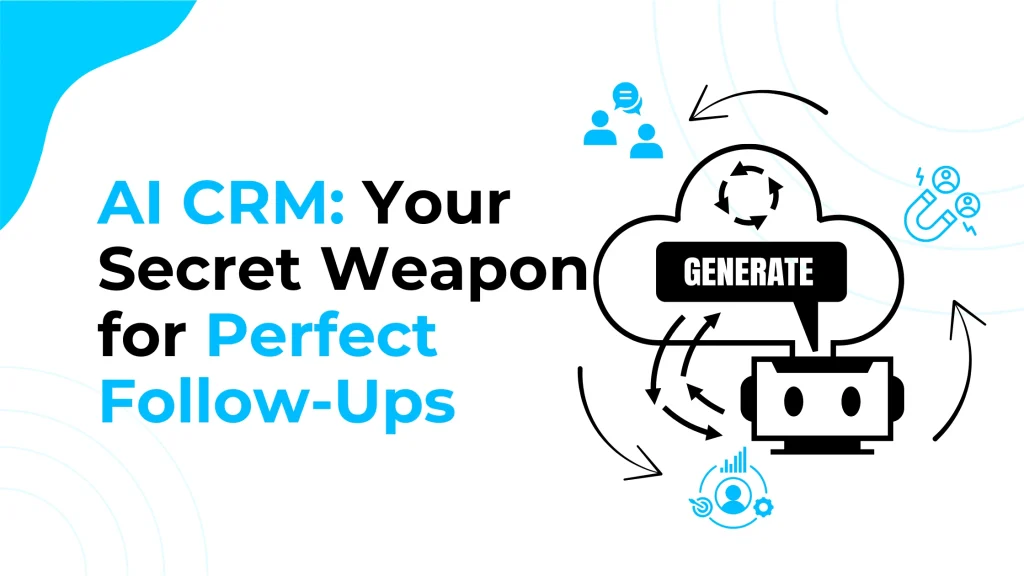AI CRM: How to Use Generative AI Inside Your CRM to Write Perfect Follow-Up Emails
A flawless follow-up email can seal or kill a deal in the world of sales. But let’s be honest, who has time to write a unique and excellent follow-up for every single lead?
This is where a smart AI assistant within your Customer Relationship Management (CRM) tool can be a game-saver.
Imagine your AI CRM doing something more than storing customer information. What if it assisted you in creating persuasive communications that build a bond and drive the sale?
This eBook will outline how to take advantage of this incredible technology to boost your follow-up process and make your AI CRM your strongest sales partner.
The Challenge: The Follow-Up Black Hole
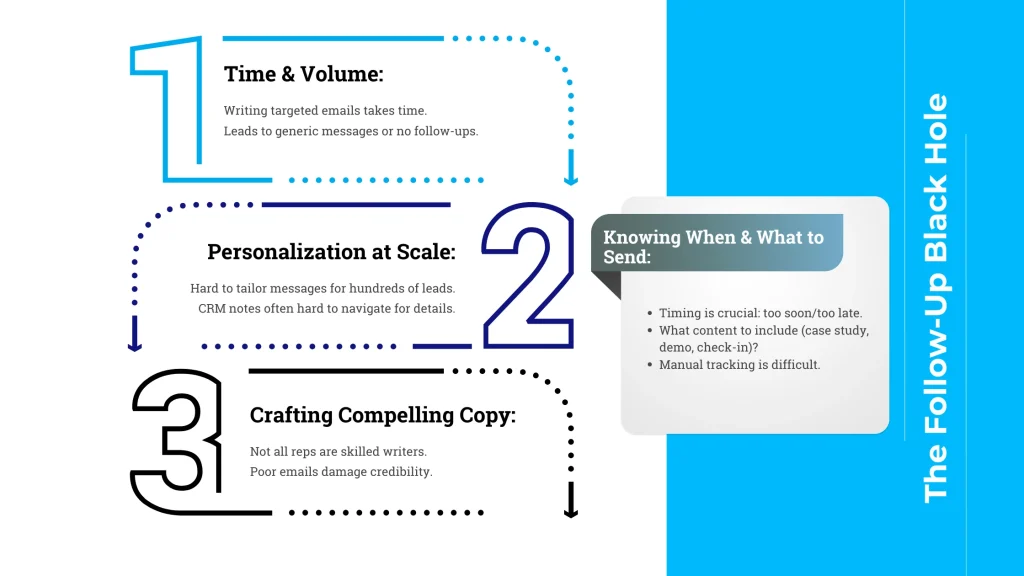
All salespeople are familiar with the pain of the follow-up. It is a vital part of the sales process, but it’s always the first thing to go when things get busy. Typical obstacles can significantly influence your success.
Time Constraints and High Volume
Salespeople have always felt the pressure of meeting their numbers and working through lots of leads. Writing an original and targeted email to every prospect takes time.
This has a tendency to result in boilerplate, templated emails missing the personalisation needed to grab a lead’s attention.
The mere number of follow-ups needed can be overwhelming, and this has a tendency to result in delays or worse, no follow-up at all.
A wonderful CRM system can assist me in being in charge of this, but in the absence of AI, the writing task is still left on the shoulders of the team.
Maintaining Personalization at Scale
Personalisation is important in communication. A lead will be more responsive to an email that is customised to their requirements and refers to past conversations.
However, this type of personalisation for hundreds of leads is asking for too much. Sales reps themselves struggle to remember the details of each encounter.
Notes in a traditional CRM are hard to scroll through. This is the most important problem that a modern AI CRM aims to solve.
Crafting Compelling and Error-Free Copy
Not all salespeople are writers by nature. It is challenging to write emails that are engaging and error-free.
A poorly composed email can damage credibility and create a negative impression of your brand. Pressure to write well and do it in a hurry tends to lead to poor communication.
A clever CRM can provide templates, but generative AI can elevate the writing to professional standards.
Knowing When and What to Follow Up With
Timing is everything. Sending a follow-up too soon will be perceived as aggressive, but waiting too long will allow the lead to become stale. Knowing what to put in each follow-up is also important.
Do you send over a case study, a link to a demo of your product, or simply a check-in? Making the correct choice involves understanding the customer’s journey well.
This is hard to track manually by way of a large pipeline. That is where AI sales tools step in.
The Solution: Your AI CRM as a Writing Partner
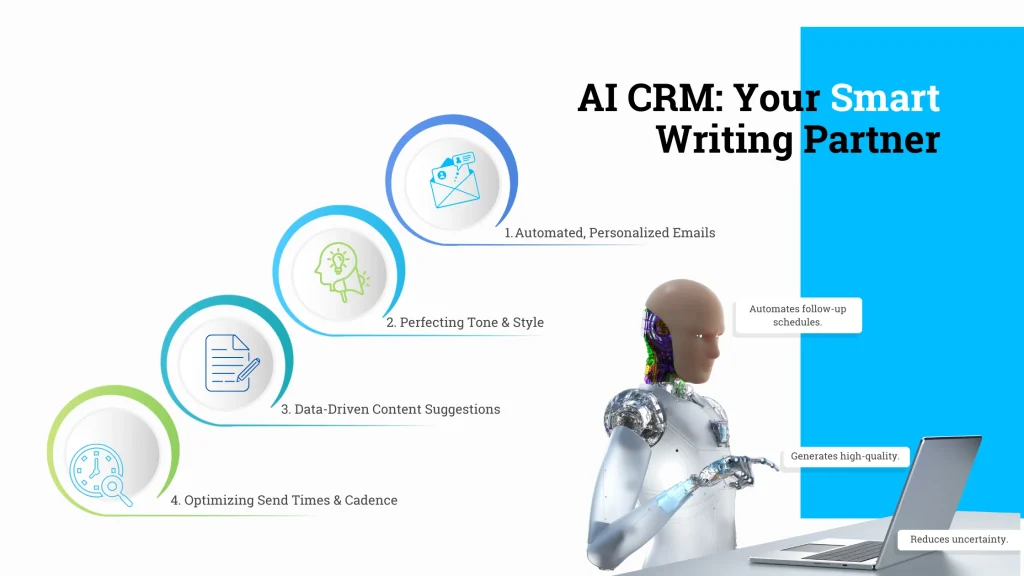
A generative AI-powered AI CRM turns the follow-up process into a compelling benefit instead of a boring task.
It works as a smart assistant, making sure that the salesperson is more proficient at speaking and quicker at doing so.
Automated, Personalized Email Generation
The greatest benefit of an AI CRM is that it can create high-quality content. Using the information in your CRM, such as past interactions, lead history, and communication history, the AI can easily compose a personalised follow-up email in a moment.
This is more than just plugging into a template; the AI knows context and can compose a message that actually sounds personalised.
This allows sales reps to do their thing: build relationships and close deals.
Perfecting Tone and Style
Whether you are composing for a formal corporate client or a laid-back startup, the AI can adapt.
It can even give you multiple versions of an email so you can choose the one most suitable for the situation.
Data-Driven Content Suggestions
A clever CRM not only writes the email but also helps you pick what to write. Based on the lead’s profile, where they are in the sales pipeline, and how they’ve interacted with you in the past, the AI CRM can even make suggestions for the best content to include.
It may indicate that it sends a specific blog entry, case study, or testimonial relevant to and of concern to the lead. These smart suggestions from AI get smarter with each follow-up.
Optimizing Send Times and Cadence
AI-powered CRM systems are able to examine data to ascertain the best time to send a follow-up email and thereby ensure it is opened and read.
They can also help you set up a follow-up schedule automation, where you remain in the lead’s mind without being too much of a nuisance.
This smart automation reduces uncertainty with follow-ups and allows you to engage with leads more effectively.
Key Features of an AI CRM for Email Writing
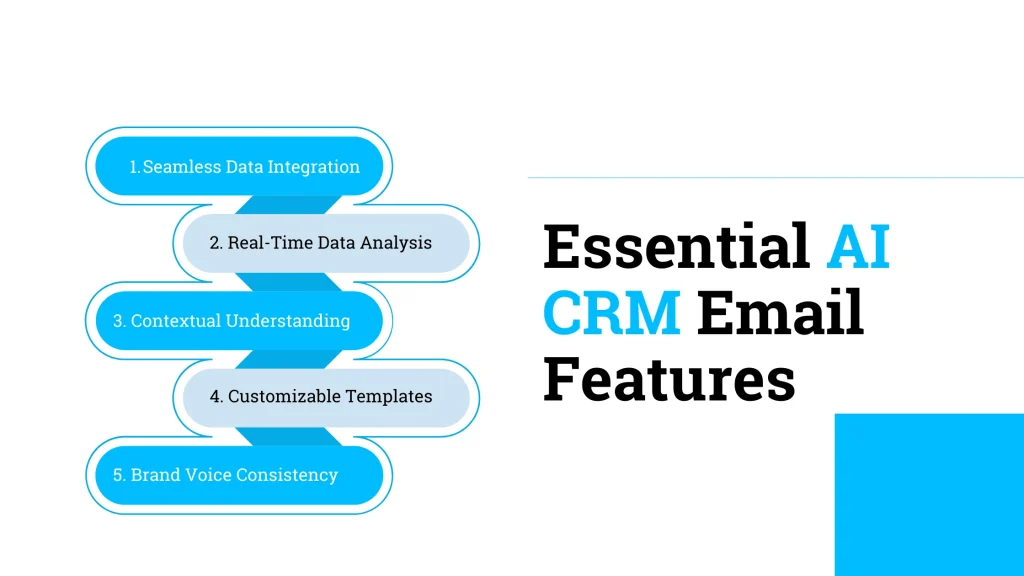
When you are looking at an AI CRM based on its email writing feature, here are some key features to look for.
Seamless Integration with Your Data
The strength of the AI in writing emails depends on how much information it has access to about your customers.
A solid AI CRM will be heavily integrated so that the generative AI can pull from contact history, deal stages, prior conversations, and support tickets to create highly contextualised messages.
Real-Time Data Analysis
The system needs to process information in real time so that it can provide the most recent and best possible suggestions. The implication is that the emails it produces are always from the latest available data.
Contextual Understanding
Look for an AI CRM that reflects an in-depth contextual understanding of sales. It should appreciate the difference between a new lead, a long-term prospect, and an existing customer, and communicate accordingly.
Customizable Templates and Prompts
While the AI can generate content from scratch, having the feature to use customisable templates and prompts is essential.
This allows you to guide the AI and ensure that the generated content aligns with your sales style and brand voice.
Brand Voice Consistency
You should be able to “train” the AI on your brand’s voice, which will make the produced content consistent. This may involve providing examples of your current sales and marketing copy.
Goal-Oriented Prompts
Having the ability to use specific prompts—such as “write a follow-up email after a product demo” or “write a courteous nudge for an unresponded proposal”—can make the AI an even more general-purpose and powerful instrument.
Performance Analytics and A/B Testing
The greatest AI CRM will not only write emails for you but also inform you what gets the job done.
Look for whether the features offer open tracking, click tracking, and reply tracking for AI-generated emails.
The ability to A/B test the different iterations of an email allows you to continue refining your follow-up strategy. This is a very significant feature in AI-based sales software.
Real Industry Use Case: Tech-Driven Sales Growth
One of the medium-sized SaaS companies had a lead conversion issue. Their 15-rep sales team was being forced to deal with more than 2,000 leads each month.
They were working with a legacy CRM, and it worked fine for storing data, but the reps were spending an average of 30% of sales emails their day crafting follow-up emails.
The emails were generic, and the follow-up cadence was jumpy, which meant that a lot of leads were going cold.
They chose to implement an AI-based CRM with next-generation generative AI functionality. The effect was quick and dramatic.
The AI CRM integrated with their lead data and began sending customised follow-up emails to all of their reps.
The AI read the lead’s industry, job title, and initial discovery call notes to craft highly targeted emails. The AI also decided the best times of day to send the emails.
Within three months of adopting the AI CRM, the company saw a 40% increase in reply rates to their follow-up emails. The sales team reported a 25% reduction in time spent on administrative tasks, allowing them to focus more on strategic selling activities. This AI-powered sales tool directly contributed to a 15% increase in their overall sales pipeline and a significant boost in morale, as the reps felt more empowered and less bogged down by repetitive tasks. The smart CRM became the backbone of their sales process.
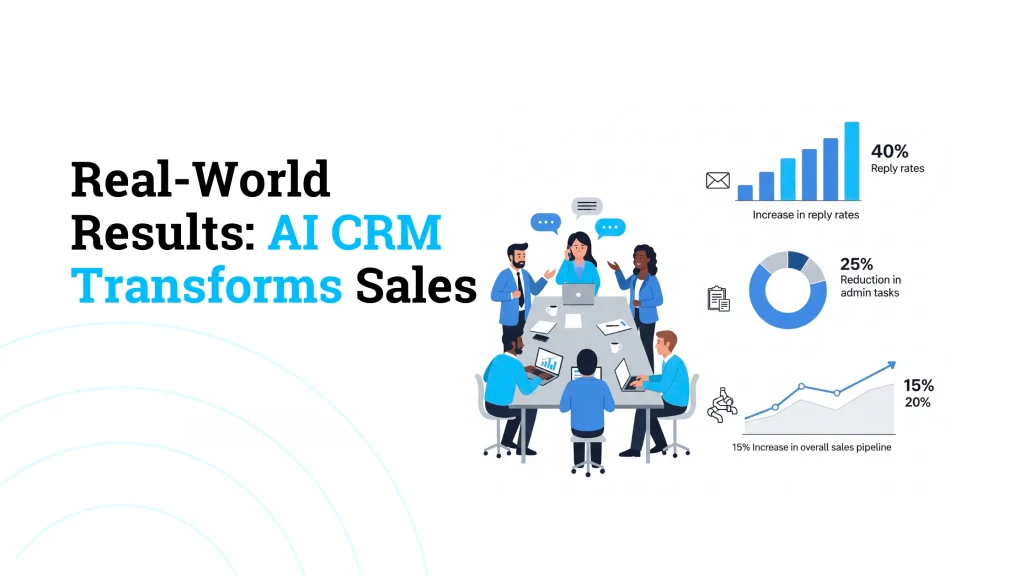
The Impact: Scalability and Future of Sales
The integration of generative AI into your CRM is not just about writing better emails; it’s about fundamentally changing the way your sales team operates and scales.
Driving Efficiency and Productivity
By automating one of the most time-consuming aspects of sales, an AI CRM allows your team to be more productive.
A single sales rep can manage a larger pipeline of leads more effectively, without sacrificing personalization.
This increased efficiency means that you can grow your business without needing to proportionally increase your sales headcount. This is the power of AI-driven personalization.
Enhancing the Customer Experience
In today’s market, the customer experience is a key differentiator. An AI CRM helps you deliver a superior experience by ensuring that every communication is timely, relevant, and professional.
This builds trust and strengthens relationships, leading to higher customer satisfaction and loyalty.
An intelligent CRM system is no longer a luxury but a necessity for customer-centric businesses.
The Future is a Collaborative AI Partnership
The role of the salesperson is evolving. The future of sales is not about AI replacing humans but about AI augmenting human capabilities.
An AI CRM acts as a collaborative partner, handling the repetitive, data-driven tasks and freeing up salespeople to focus on the human elements of selling: building rapport, strategic thinking, and complex problem-solving.
As AI technology continues to advance, the capabilities of your AI CRM will only grow, offering even more sophisticated ways to engage with customers and drive growth.
FAQ :
Q1: What is an AI CRM?
An AI CRM is a customer relationship management platform that uses artificial intelligence to automate and enhance sales, marketing, and customer service processes.
In the context of this article, it uses generative AI to create personalized content like emails, helping sales teams communicate more effectively. An intelligent CRM system is a core component of modern sales technology.
Q2: Will an AI CRM replace my sales team?
No, the goal of an AI CRM is not to replace salespeople but to augment their abilities. It handles repetitive and time-consuming tasks, like drafting emails, allowing sales reps to focus on high-value activities such as building relationships and strategic selling. It’s an AI-powered sales tool designed for collaboration.
Q3: How does an AI CRM ensure the emails are personalized?
An AI CRM connects to all your customer data, including contact details, company information, past interactions, and notes from calls.
It analyzes this data to understand the specific needs and context of each lead, using that information to draft a highly personalized message that goes far beyond simply inserting a name.
Q4: Can I customize the tone and style of the AI-generated emails?
Absolutely. A robust AI CRM will allow you to set guidelines for the brand voice and tone. You can provide examples of your preferred communication style, and the AI will adapt to ensure all generated content aligns with your brand identity, making it a truly smart CRM.
Conclusion
The journey from a potential lead to a loyal customer is built on a series of meaningful conversations.
In the digital age, your follow-up emails are a critical part of that dialogue. By leveraging the power of an AI CRM, you can ensure that every follow-up is a step forward, not a missed opportunity.
This technology empowers your team to write perfect, personalized emails at scale, transforming your CRM from a simple database into a dynamic, revenue-generating engine.
Ready to see how an AI CRM can revolutionize your sales process? Explore our main pillar page on AI CRM to learn more and request a demo today!

